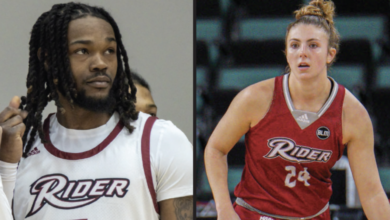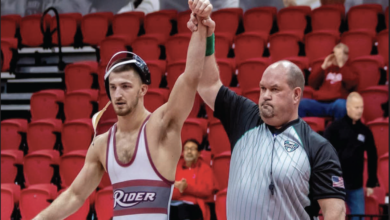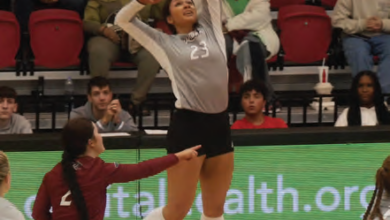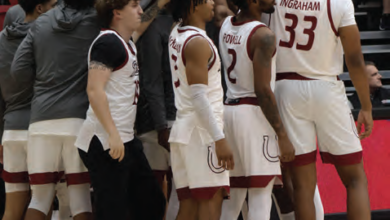
A look back at Rider football
By Shaun Chornobroff
The year was 1946, Rider was on the heels of World War II, and the Trenton campus was returning to normal. A sense of pride could be felt across the nation. But the Roughriders students (yes, the Roughriders), who were sporting their purple and gold, were feeling good as they had a football team to support every weekend for the first time in 15 years.
The 1948 Rider College yearbook said that the 1947 Roughriders were the first team to have varsity football. A quick peek at the 1931 team shows that it was actually a freshman team that failed to score a point during its four-game season and earned one tie that year.
But the 1947 Roughriders were going to be different. The team had played the 1946 season at the junior varsity level and was ready for the leap.
In the end, Head Coach Tom Roemus felt the pain of having an upstart program. Rider’s lack of experience showed as it went winless and failed to make it into double-digits in a single game throughout the season, which opened with a 79-0 drubbing of now Metro-Atlantic-Athletic-Conference (MAAC) rival Canisius College.
Following that season, Roemus was replaced by Smith L. Byham which seemed to be a turning point for the purple and gold. The 1948 edition of “Shadow,” which was Rider College’s yearbook, stated, “This year football will turn over a new leaf at Rider. Smith L. Byham has received the position of head coach for the 1948 season. The squad will go through intensive spring and summer training and all efforts will be in the direction of making Rider a standout football school among the smaller colleges of the East.”
And that’s exactly what Byham did.
The 1948 Roughriders started 10 freshmen, and despite “looking fearfully” towards their first game against West Chester, Rider was successful to the surprise of many.
The Roughriders, led by quarterback Allen Costil, who wore two different numbers throughout that season, went 6-3.
The season started with a hard-fought loss to West Chester, but the team’s second game, a 49-6 blowout victory of a significantly bigger City College of New York team was a statement win.
Rider scored 25-plus points three times that season, proving Byham’s efforts successful.
It would be Byham’s only season at the helm, albeit a great one considering where the team was the year before. But, new coach Joe Behot improved off of an already incredible job done by Byham.
The 1949 Roughriders, like the 1948 team, started the year with a loss, this time to Bowling Green State University.
After that game, Rider continued to go onto a seven-game winning streak to finish their season 7-1. Rider had two blowout victories in the season, a 39-7 win over St. Michael’s College (of Vermont) and a dominating 53-0 win over Panzer College (later merged with Montclair State University).
The game of the year occurred on Nov. 5, 1949, when the Roughriders took down Wilkes College in a 41-34 shootout on the Colonels’ homecoming night.
The 1950 team had less depth than the ‘49 team. Behot said of the team, “our lack of backfield depth will really hinder us this year.” Behot also said the team had a much tougher schedule, even admitting losing multiple games was possible.
The team lost multiple games, but had a good season finishing 5-2-1. Once again, the Roughriders started poorly.
For the third-consecutive season Rider dropped its opening game, only to finish with a winning record. Rider lost to Geneva College 14-0 before fighting to a scoreless tie with Bowling Green the very next game.
Over its last six games, Rider found its stride and had a record of 5-1 and averaged 26.5 points per game, as the backfield depth seemed to not hinder the Roughriders as much as Behot initially thought.
Just as impressive as Behot’s offense was his defense, which repeatedly stifled opponents throughout the season, only giving up 10.6 points per game and surrendering more than 20 points only once that season.
The 1951 Roughriders were hit with a tough blow in the middle of their season, as sophomore halfback Eddie Wilson was dismissed from the university. Wilson was the team leader in touchdowns and was dismissed from the school for not reporting to classes.
For the first time since its revival on the varsity level in 1947, Rider won its season opener. Once again it played Geneva College, this time slaughtering them 44-0.
The Roughriders continued their success concluding with a 6-2 record in the 1951 season.
This season was the final season of Rider football and, if there is any silver lining, the team won its final game as a program, a 26-7 home victory against East Stroudsburg.
The rumors of the school cutting the football program ran rampant not long after the football season’s conclusion. It seemed that these rumors could not be escaped, and the loss of Roughriders football seemed to be inevitable.
In the Dec. 7, 1951 edition of The Rider News, Sports Editor Donald Oberholzer published an open letter to the athletic committee in an attempt to save football at Rider. Oberholzer said in the letter that the athletic committee was considering the plan, but “no definite decision” had been reached.
Oberholzer made several points as he passionately pleaded with the school at one point saying, “Football, gentlemen, is a great sport. Most students would hate to see it go. Dropping the sport certainly isn’t going to build school spirit.”
Oberholzer continued this point in different points of his letter, even showing the athletic committee that this issue goes beyond dollar signs and revenue.
“The last pep rally convinced me student spirit was rising. Dropping football would put more of a damper on the rising tide of Rider spirit than the showers did that night in October,” Oberholtzer wrote. “Money matters are out of my field. But remember, gentlemen, there are intangible things that money can’t buy. Spirit is one of those. High school students intent on choosing a college consider football synonymous with college life. These are things a profit and loss statement don’t reveal.”
Oberholtzer concluded his letter by saying, “Football is king. Long live the king.”
Unfortunately, Oberholtzer’s pleas did not suffice, as the college eventually cut football not long after. And as Oberholtzer said, students were upset.
In a letter to the editor published in September of 1952, a student who referred to themselves in the conclusion of the letter as “Miss Football” embodied the feeling of most Rider students then and to this day.
“It is nearly Fall, in the country the leaves are beginning to turn color. There’s a chill to the air and almost every collegian is looking forward to the reign of King Football.”
“However, here at Rider, there is nothing to look forward to, for football was discontinued last year,” the letter started by saying.
The letter stated some of the university’s reasons for cutting football, like the formation of a soccer team, improvement of intramurals, a decision to stress basketball further and that the sport cost too much.
The author of the letter admitted football was a high-priced sport and that basketball is the most important sport for a school to stress “if it wishes to obtain a big name in athletics.” But it was in the last paragraph where the writer made a point that identified both with students in 1952 and myself, among many students today, who openly wish the university had a football program.
“The gist of this letter is that, for me and most students, something is missing this fall — something that, however little, was here last year. The thing which is lost and should be returned is football,” the letter stated.
Head Coach Joe Behot was deservingly inducted into the Rider Athletics Hall of Fame in 2008, not long before his death in 2010. Behot compiled a record of 18-5-1 in his three years at the helm.
Almost six decades after its final game not much lives on for Rider football. Most, if not all, of the players and coaches have passed, but there are old articles and archives, along with the “Undefeated since 1951” T-shirts which many students continue to wear today.



